Column: L.A.’s cracked, ruptured sidewalks are a scandal. Where is City Hall?
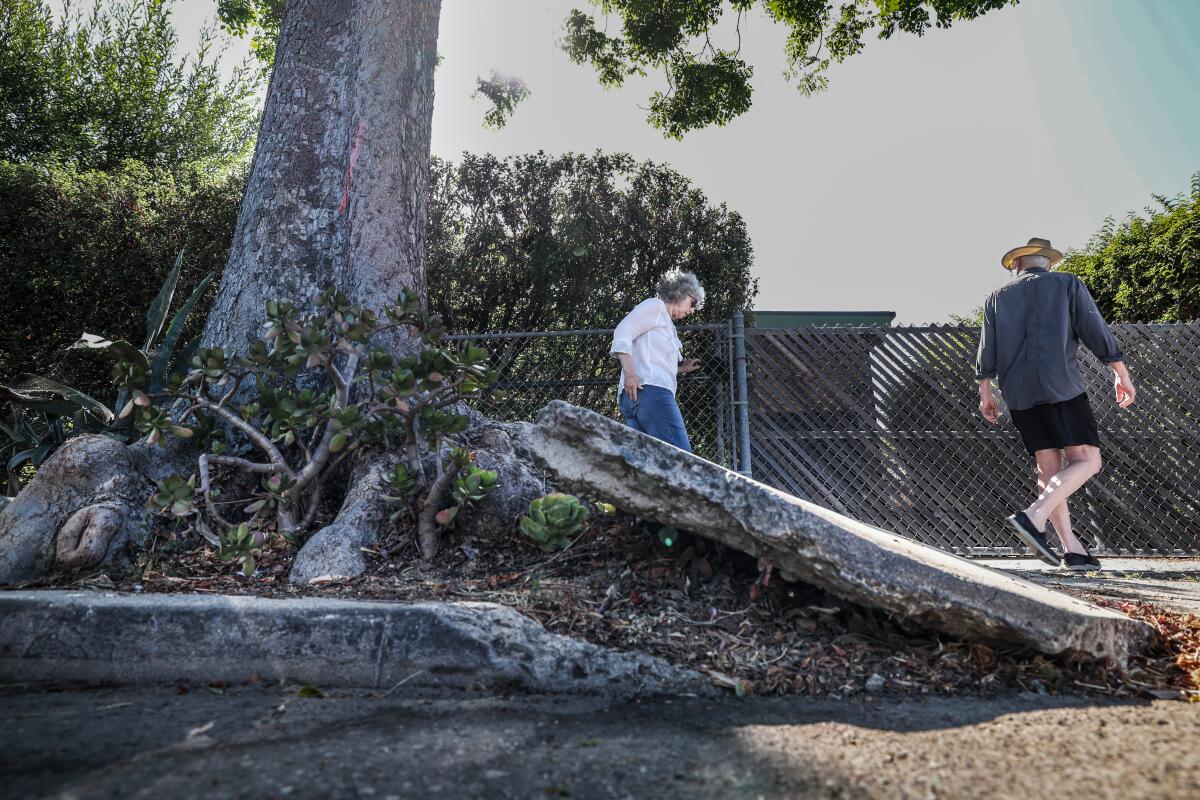
You may think of Venice as a flat neighborhood of beach promenades and walkable, shop-lined boulevards, but that’s not taking into account the sidewalk mountain ranges scattered about the area.
Dennis Hathaway, 81, and his wife, Laura Silagi, 78, were walking their dog Marlowe recently when Silagi encountered one of those ranges and tripped on uneven pavement and went down hard.
“I fell on my knees,” Silagi told me at the spot where it happened, on Nowita Place near Lincoln Boulevard.
There are much worse ruptures on that same street, but they’re obvious, and Silagi — an artist and photographer — said it’s sometimes the lesser hazards that do you in.
California is about to be hit by an aging population wave, and Steve Lopez is riding it. His column focuses on the blessings and burdens of advancing age — and how some folks are challenging the stigma associated with older adults.
“I turned around and I thought, ‘Oh, no,’” said Hathaway, who watched his wife go chin-first into the pavement, drawing blood.
While we were talking about Silagi’s mishap, neighbor Liz Laffin chimed in to say her father took a spill on this same street about four years ago, when he was 75.
“He split his brow,” she said. “He was bleeding profusely.”
Is there an L.A. neighborhood that doesn’t have scandalously cracked, sunken and uplifted sidewalks? Not that I’m aware of, and it’s been that way for decades. Good luck if you’ve got vision or balance issues, or if you’re using a cane or a wheelchair, or pushing a stroller.
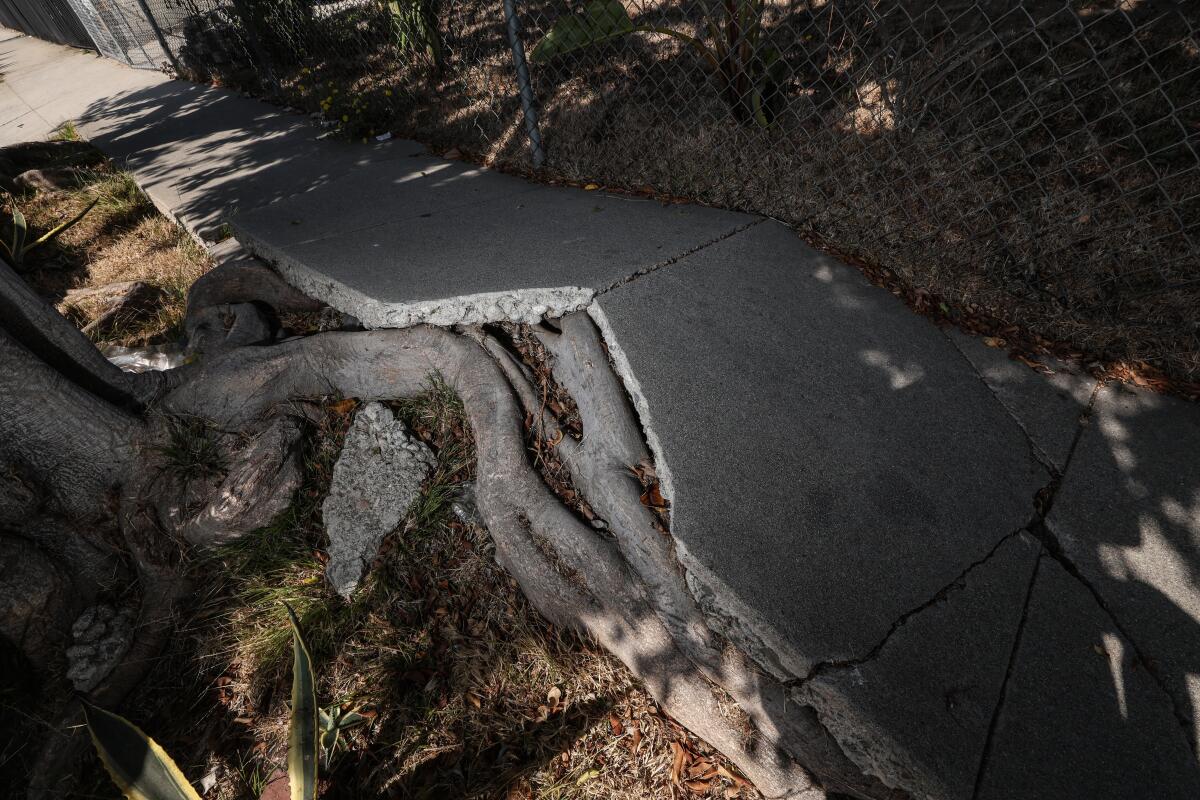
Hathaway, who writes a blog called An Octogenerian’s Journal, had emailed me to suggest that with a growing population of older people trying to stay fit by walking, I should revisit the sorry state of sidewalks, which I first wrote about 10 years ago. Good idea, especially since L.A. Mayor Karen Bass is promoting a largely “no-car” Olympics in 2028, which means a lot of people would be walking to and from bus and train stations.
So I made some inquiries and learned two things: Little has changed in the last decade, and L.A.’s handling of the matter is as broken as the sidewalks themselves.
The backlog of requests for sidewalk repairs stood at about 50,000 as of three years ago, according to an audit by then-City Controller Ron Galperin. But there is no long-range plan in place to make those fixes, and even if there were, the work would take years and cost hundreds of millions of dollars.
If not for the settlement of a lawsuit against the city on behalf of disabled people who were unable to use sidewalks because of impassable pavement or lack of curb ramps, there’d be virtually no progress at all. But even those fixes have been slow-going, with several thousand jobs in the queue, and a 2023 City Hall memo said that “wait time can exceed 10 years.”
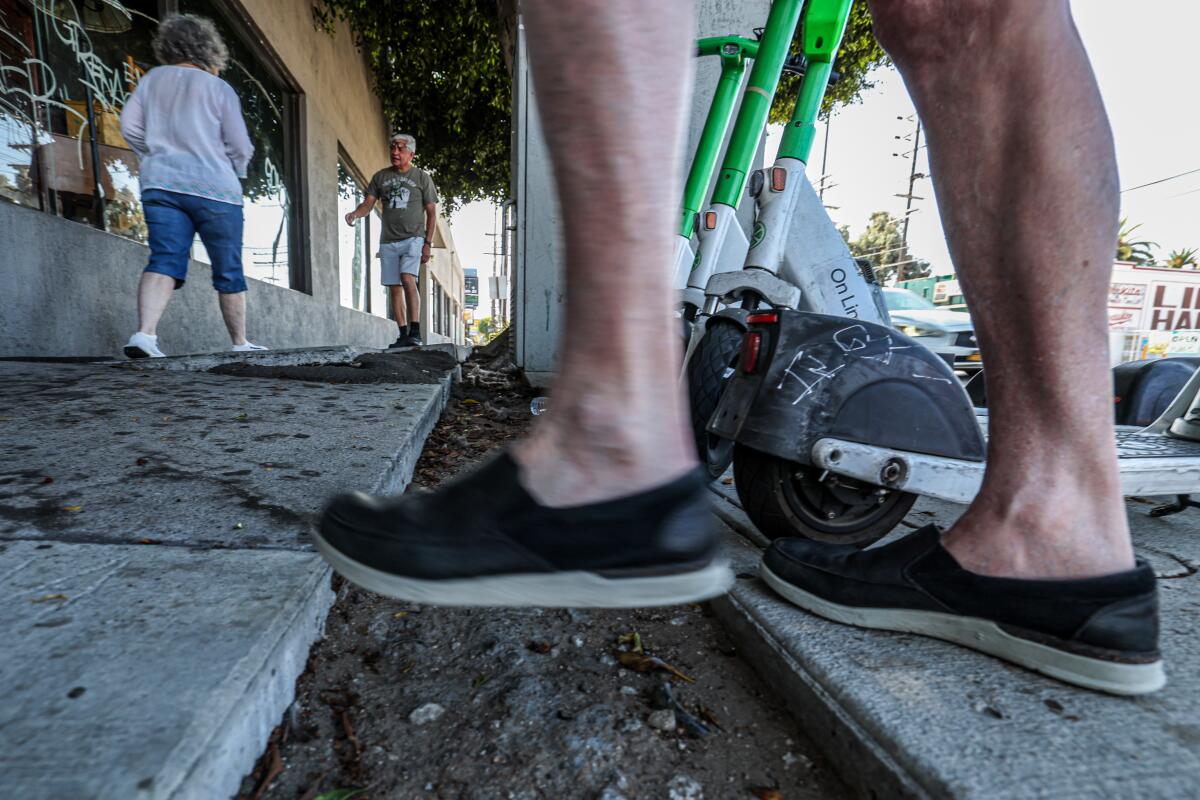
Meanwhile, the city is paying a small fortune to settle lawsuits involving sidewalk-related injuries. Galperin’s report put the cost of more than 1,000 lawsuits between 2020 and 2023 at more than $35 million.
“It’s infuriating every time we spend money to pay an injury claim when we could have fixed the sidewalk instead,” said Councilmember Traci Park, who represents Venice and told me broken sidewalks make the top-five list of complaints to her office.
Staying on top of basic issues has been compromised, Park said, by the huge cost of time and resources spent to address homelessness. That is true to a degree, but the sorry state of sidewalks predates the epic rise of homelessness.
After my stroll through the peaks and valleys of Venice, I took a broken-sidewalk tour of Koreatown with John Yi, a candidate for state Assembly and former director of the nonprofit advocacy group Los Angeles Walks.
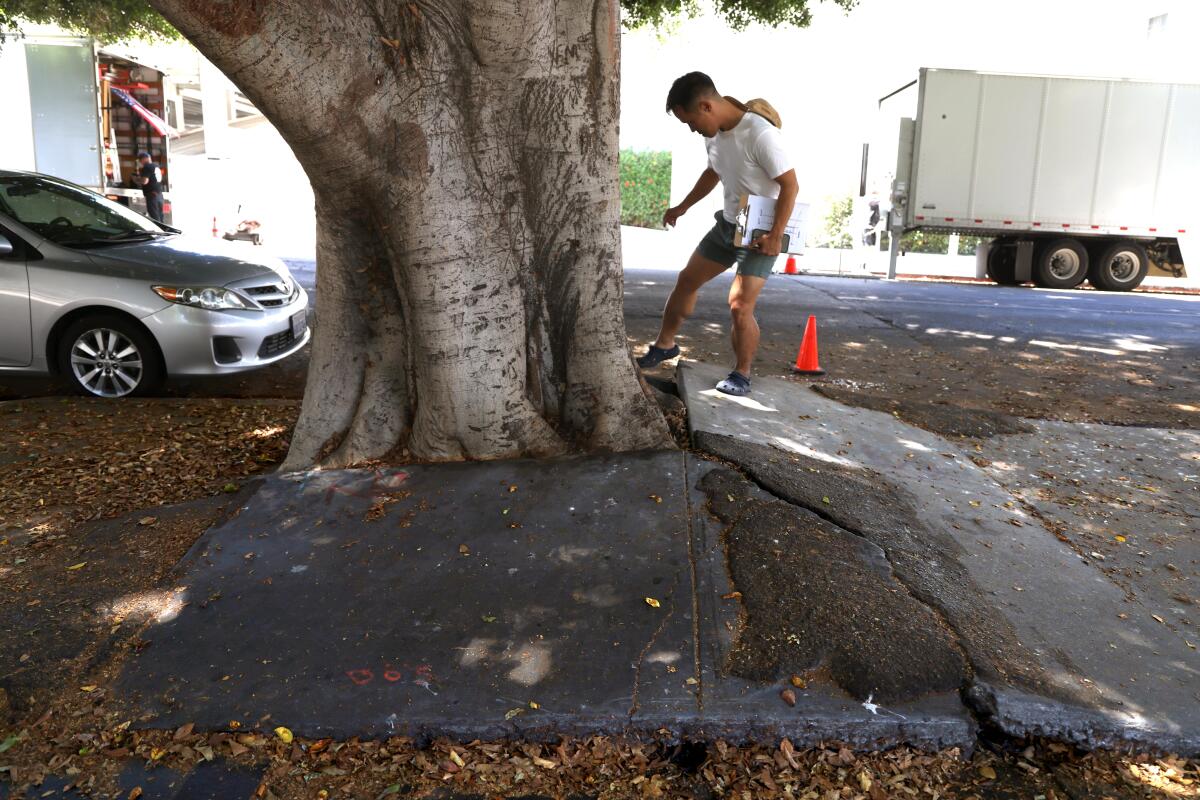
“We have the resources, and we know how to do nice sidewalks. We don’t have the political prioritization,” Yi said as we passed a homeless person lying on the pavement near 7th and Wilshire.
On Manhattan Place, sidewalks were cracked and uplifted and trash was strewn everywhere, as if we were in a mini-landfill. A discarded mattress leaned against a tree, with a nightstand nearby. A resident called to us from a second-floor apartment window, asking if we were there to do something about the trash.
No, we said, we were inspecting broken sidewalks.
“The sidewalks are disgusting,” he responded.
For years, the city has opted for amateurish temporary fixes, using asphalt to fill cracks and crevices the way you might use frosting to mask the collapse of a cake. On Western, we came upon an example of how that can go wrong. A slab of asphalt that had been used to cover up sidewalk damage caused by the roots of an un-maintained tree had become embedded into the trunk and risen at a sharp angle.
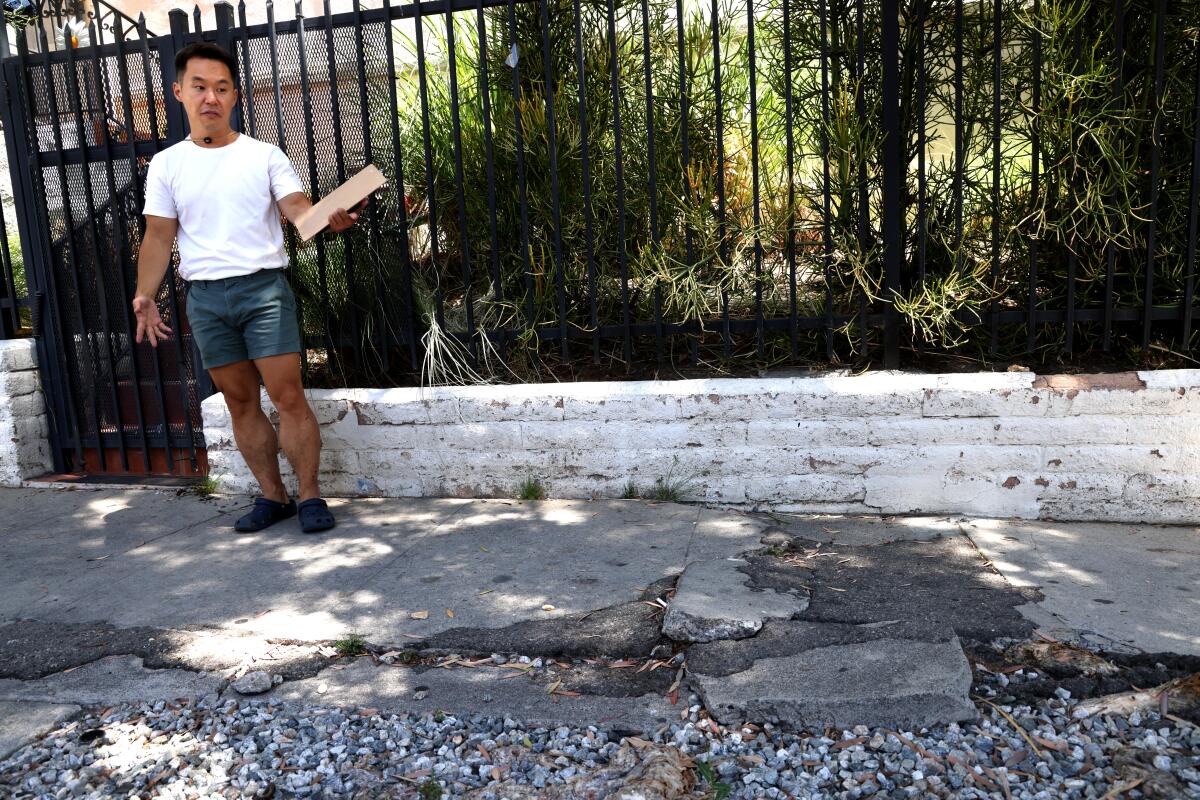
It was a uniquely L.A. sculpture — a real-time, evolving monument to municipal dysfunction. “We’re so used to this kind of decrepitness that somehow it’s become an L.A. vibe,” Yi said. “You become conditioned to say this is what normal is.”
On nearby Oxford Avenue, a ficus tree’s shallow roots (the city’s failure to maintain its trees is the biggest cause of sidewalk upheaval) have pretty much destroyed a 12-foot stretch of sidewalk, elevating it a foot or more above street level at its peak. It occurred to me that in 2028, L.A. should skip the skateboard park and have Olympians go head to head on the city’s thousands of miles of sidewalk ramps and canyons.
While Yi and I were examining the damaged sidewalk on Oxford, two retired LAPD cops who were working security at a nearby movie shoot came over to say that day and night, rats the size of beavers scamper in and out of the caves created by the jagged, uplifted slabs of concrete.
Jessica Meaney of Investing in Place, a watchdog nonprofit focused on quality-of-life issues, neatly summed it up:
“We haven’t made progress, and the city has been dragging its feet on any meaningful program for improving its sidewalks,” Meaney said. “Los Angeles is the only major city without a capital infrastructure plan. ... I think L.A. and Mayor Bass really need to reconcile the lack of leadership and citywide vision for our sidewalks and our public spaces.”
In Venice, Hathaway and Silagi told me they haven’t bothered to report their worst stretches of sidewalk, one of which resembles a model of the Santa Monica Mountains. “I’ve never seen anyone fixing a sidewalk in all this time,” said Hathaway, who has lived in the same home since 1986. He brought up the problem while serving on the Neighborhood Council more than 20 years ago, he said, “but nobody seemed that interested.”
Park called the problem “completely unacceptable.” She said there’s been talk at City Hall of finding ways to speed up the process, and she’s hoping the added pressure of the coming Olympics will be a prod.
Not that it should take a two-week athletic event four years down the road, and the arrival of visitors from around the world, for city officals to take care of the basics on behalf of locals.

If you’d like to keep the pressure on City Hall, send me stories and photos of Olympic-class ruptures in your neighborhood. I’ll search out a three-level podium of uplifted sidewalk for the awards ceremony.
Keep in mind that competition is sure to be stiff. I’ll see if I can talk Snoop Dogg into awarding the gold, silver and bronze medals.
steve.lopez@latimes.com
More to Read
Sign up for Essential California
The most important California stories and recommendations in your inbox every morning.
You may occasionally receive promotional content from the Los Angeles Times.










